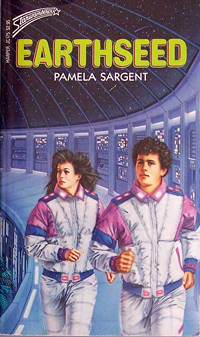Screenwriter-producer Melissa Rosenberg helped make Breaking Dawn a box office smash by staying faithful to the books. With her next project Earthseed, she ditches fan loyalty for high fidelity, by "sounding out" her script with F/X experts at ILM.

When tapped to write the screen adaptation of the blockbuster, brooding Twilight books, screenwriter-producer Melissa Rosenberg took what you might consider the writer’s Hippocratic Oath—a first-do-no-harm procedure that safely transplanted the story of Bella and Edward from bestsellers to the box office: See the book on-screen.
“The emotional ride has to be the same as the books,” Rosenberg says. For the latest film, Breaking Dawn, that meant, “no matter what, I had to hit the three important sequences to the story, the wedding, the honeymoon and the birth. Those three sequences are hugely important to audience. At the same time, I couldn’t think about it too much or I was going to be paralyzed with fear. I mean, at a certain point you can’t please everyone.”

Judging by the film’s opening weekend, she’s come pretty damn close to making everybody happy. Her scrupulous cinematic renderings of the fourth and penultimate installment of Stephenie Meyer's tales of vampire teen-fangst got box office blood pumping with an estimated $139.5 million in domestic box office, a healthy chunk of a $2 billion global franchise.
It’s also the kind of figure that catapults the former Dexter staffer and writer of the dance movie Step Up into a league of her own as one of the most successful screenwriters in recent Hollywood history. And with that, a half-dozen newly announced projects, including a television adaptation of AKA Jessica Jones for ABC and Marvel (with comic book genius Brian Michael Bendis), an opportunity to break that “See the book on-screen” rule. With her newest project Earthseed, she's doing that quite literally--and developing her screenplay by creating its sound.
 To develop the film adaptation of dystopian teen trilogy Earthseed, Rosenberg trekked up to George Lucas’s special effects mecca Industrial Light & Magic and sat with a team of sound specialists to think about the aural aspects of a futuristic world, while drafting the script itself. “Usually the screenwriter turns in the film, then the director starts building the imagery and production details,” says Rosenberg. “What’s remarkable is Paramount is starting with these technical concepts from the very beginning. So as I’m writing the story, I’m in a room with the world’s best technical thinkers and we’re asking: ‘What are the sounds of this world? Of these characters? That’s kind of amazing to have access to ILM this early in the process.”
To develop the film adaptation of dystopian teen trilogy Earthseed, Rosenberg trekked up to George Lucas’s special effects mecca Industrial Light & Magic and sat with a team of sound specialists to think about the aural aspects of a futuristic world, while drafting the script itself. “Usually the screenwriter turns in the film, then the director starts building the imagery and production details,” says Rosenberg. “What’s remarkable is Paramount is starting with these technical concepts from the very beginning. So as I’m writing the story, I’m in a room with the world’s best technical thinkers and we’re asking: ‘What are the sounds of this world? Of these characters? That’s kind of amazing to have access to ILM this early in the process.”
It also hints at a compelling and rather logical new approach to moviemaking. One you might call green screenwriting--a way of building in the digital F/X and visual possibilities well before production starts. Heck, in the case of Earthseed, it’s happening before a director is even attached. “It’s an approach I’m enjoying as I build this universe,” says Rosenberg. “I have access to all of these technical advisers who are helping me envision this universe and sharing what’s possible in the story.” Not to mention, with ballooning post-production budgets, “green screenwriting” might give a studio like Paramount an earlier and more accurate read on how much a flick might cost. You hear that, Green Lantern?